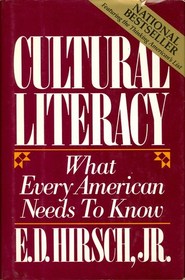Lisa P. (lisalu) reviewed Cultural Literacy: What Every American Needs to Know on + 21 more book reviews
Helpful Score: 2
Great book full of useful information on just about everything. The author feels that this is what every person should know in order to be a good citizen. Some of his thoughts are pretty dated however it is a great resource book to have on hand when you are wondering about just about anything (history, science, grammar, idioms etc...) Worth having around.
Helpful Score: 1
From an Amazon reviewer:
I found 'Cultural Literacy' to be a solid, informative reference. I originally hoped to sit down and read it straight through, but soon found it best to tackle the content piecemeal. My only real complaint is that I wish the entries were more in-depth. If you wanted to look up Goethe, for example, you would find only a few sentences on that extraordinary life. On the other hand, I think this book is ideal as a birthday or Christmas present for middle- and high-school students. It would help them understand the genealogy of ideas a little more, and provide them with an insight of why their everyday lives are the way they are.
Keep in mind this book is not magic - it will not turn one into Isaac Newton - but Hirsh holds up his end of the bargain in the author-reader relationship. The Bible section was particularly informative. Not only are persons of note mentioned there, but key quotations from the Bible are further explained as well. Students are not the only ones who can benefit from this work. Artists, writers, fledgling historians, trivia lovers, and avid readers all stand to profit. The topics are as numerous and varied as the nations of the earth. Buddhism, Sigmund Freud, Sitting Bull, and the Internet are all covered within.
I found 'Cultural Literacy' to be a solid, informative reference. I originally hoped to sit down and read it straight through, but soon found it best to tackle the content piecemeal. My only real complaint is that I wish the entries were more in-depth. If you wanted to look up Goethe, for example, you would find only a few sentences on that extraordinary life. On the other hand, I think this book is ideal as a birthday or Christmas present for middle- and high-school students. It would help them understand the genealogy of ideas a little more, and provide them with an insight of why their everyday lives are the way they are.
Keep in mind this book is not magic - it will not turn one into Isaac Newton - but Hirsh holds up his end of the bargain in the author-reader relationship. The Bible section was particularly informative. Not only are persons of note mentioned there, but key quotations from the Bible are further explained as well. Students are not the only ones who can benefit from this work. Artists, writers, fledgling historians, trivia lovers, and avid readers all stand to profit. The topics are as numerous and varied as the nations of the earth. Buddhism, Sigmund Freud, Sitting Bull, and the Internet are all covered within.
Margaret C. (6athome) reviewed Cultural Literacy: What Every American Needs to Know on + 38 more book reviews
Helpful Score: 1
Cultural literacy is the hidden key to effective education in America.Includes an appendix "What Literate Americans Know" compiled by Hirsch and colleagues.
Helpful Score: 1
Dr. Hirsch shows that cultural literacy-the graps of background information that writers and speakers assume their readers already have-is the hidden key to effective education in America.
Has a list of terms, quotes, titles, places, people literate Americans should know in the back of the book.
Has a list of terms, quotes, titles, places, people literate Americans should know in the back of the book.
E. D. Hirsch, Jr. published Cultural Literacy: What Every American Needs to Know , a book that became a best-seller and a manifesto for the 'core knowledge' movement in school curriculum (also known as 'back to basics'). In Cultural Literacy, Hirsch identified 5,000 names, dates, essential facts and concepts that an educated person should know, in fields as diverse as science, culture, religion, and art history.
According to Hirsch, the main goal of education is acculturation, that is, the transmission of specific information shared by the adults of a particular society to the next generation. He argues that having familiarity with this information is a prerequisite for full citizenship. In his own words, "... literate culture has become the common currency for social and economic exchange in our democracy, and is the only available ticket to full citizenship.... Membership is automatic if one learns the background information and the linguistic conventions that are needed to read, write, and speak effectively." Moreover, he claims, "cultural literacy constitutes the only sure avenue of opportunity for disadvantaged children."
According to Hirsch, the main goal of education is acculturation, that is, the transmission of specific information shared by the adults of a particular society to the next generation. He argues that having familiarity with this information is a prerequisite for full citizenship. In his own words, "... literate culture has become the common currency for social and economic exchange in our democracy, and is the only available ticket to full citizenship.... Membership is automatic if one learns the background information and the linguistic conventions that are needed to read, write, and speak effectively." Moreover, he claims, "cultural literacy constitutes the only sure avenue of opportunity for disadvantaged children."




